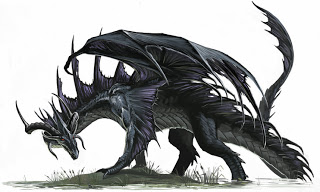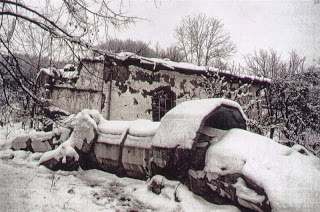Mythology is first and foremost a social phenomenon which successfully permeates and connects different religious, magical and geological influences producing absolutely fascinating effect - the created myths have a pronounced social effect since through them the Roma, as a nomadic people, could hold on to their unity but also assimilate more easily in all new locations.
The Roma population in Bosnia are mostly Muslims, but because of their dramatic and unlucky past, especially in Romania where they were treated as slaves for centuries, they kept some segments of Christianity such as celebrating certain Christian holidays such as Saint George's day (May 6th) or Christmas. Even though they have Muslim names and they celebrate both Eid's, the Bosnian Roma don't practice fast during Ramadan claiming that sin doesn't enter through the mouth but exits through them. Mainly, the Roma take from every religion the things that suit them and adjust it to themselves and in their everyday life. That's why in Bosnia there is a saying that "among Roma there is no religion".
Even though by analysing descriptions and activity of good and bad demons one can easily notice a chronic lack of old beliefs which they took with themselves from India, the Roma assimilated all myths from other peoples and enriched them with new and original additions making them part of their culture and identity. Though one gets an impression that, besides the names of mythological beings, there are no other connections with the motherland and its rich spiritual culture, still in some expressions one can hint the old beliefs such as the traditional burning of the dead. Namely, the Roma for the word "burial" use praxosarav, which means - I turn into ashes.
In some myths some specific characteristics of Roma are pronounced which actually reflect the mentality of the people, their habits, fears and thoughts. Belief about javišti, though a mixture of the Bosnian belief about Lampir and Prepasti, it is enriched by one of the biggest fears of ancient Roma prone to stealing, namely, they believed that javišta can warn the owner about the thief, and so make his undertaking dangerous and fruitless. Similarly, constant desire of all nations for gold and riches is deeply rooted in the Roma conscience. According to their belief the easiest way to get gold is through Karankočija but usually because of the lack of modesty, the demon would trick the human and would steal what he brought the first time. Karankočija can usually be seen by older people and through legends a lesson is imposed that man even in his old age cannot triumph over himself, his greed and imprudence.
The mythology of Bosnian Roma relies heavily on traditional legends and myths about various supernatural beings of Bosnia and Herzegovina but also numerous other peoples and cultures. A good example for observing common elements is the most famous demon of all - Karankoči. Besides the similarity in names Karankoči and Karanđoloz, which stem from the Turkish language and signify something black, dark, which alludes to a black physical form or black hat, both demons have identical time of appearance - winter. Karanđoloz always appears in the period of the greatest winter i.e. during zehemerija - January, and usually small disobedient children are frightened by this legend. Classic con of the described demon through transformation of gold is characteristic also of Bosnian legends about the Jinn, the legends say that some people, when they performed the spiritual ritual called daira, were fooled by the Jinn and instead of gold they received coal.
Another example of identical or very similar beliefs is also the demon Aždaha. Namely, Aždaha is among the Bosniaks a mythological creature which most resembles a dragon. Fragments of belief in Aždaha is still present today in practice of soothsayers, which, when analysing various forms of lead, see some sort of dent in the lead or an opening, sets the patients diagnosis with the statement: "something swallowed you as an Aždaha", alluding to the effects of the demon. According to the sayings of old Bosniaks, Aždaha is a demon which lives in dark caves or openings in the ground and attacks and swallows people and animals.
But, we shouldn't disregard the real possibility that the domicile people of an area in Bosnia and Herzegovina, under the influence of the Roma legends used some elements for creating their own. Ušušur, water demon which attacks and drags people under the water, it could have its mythological foundation in the myth about Ledaši or Karakončiju. In favour of this thesis the data that the legend about Ušušur is located in a very narrow area and is not present in a large part of BiH.











» Love spell with menstrual blood
» Bacanje graha - zavirimo malo u sudbinu!
» Sanovnik - tumačenje snova
» Velike čarolije sa nožem
» PAGANSKI/VJEŠTIČJI TALISMANI I AMULETI (Bosnian/English)
» Solju protiv magije
» MAGIC FOR EVERY WITCH
» Molitvom i svijećom uklonite zlo i lošu sreću